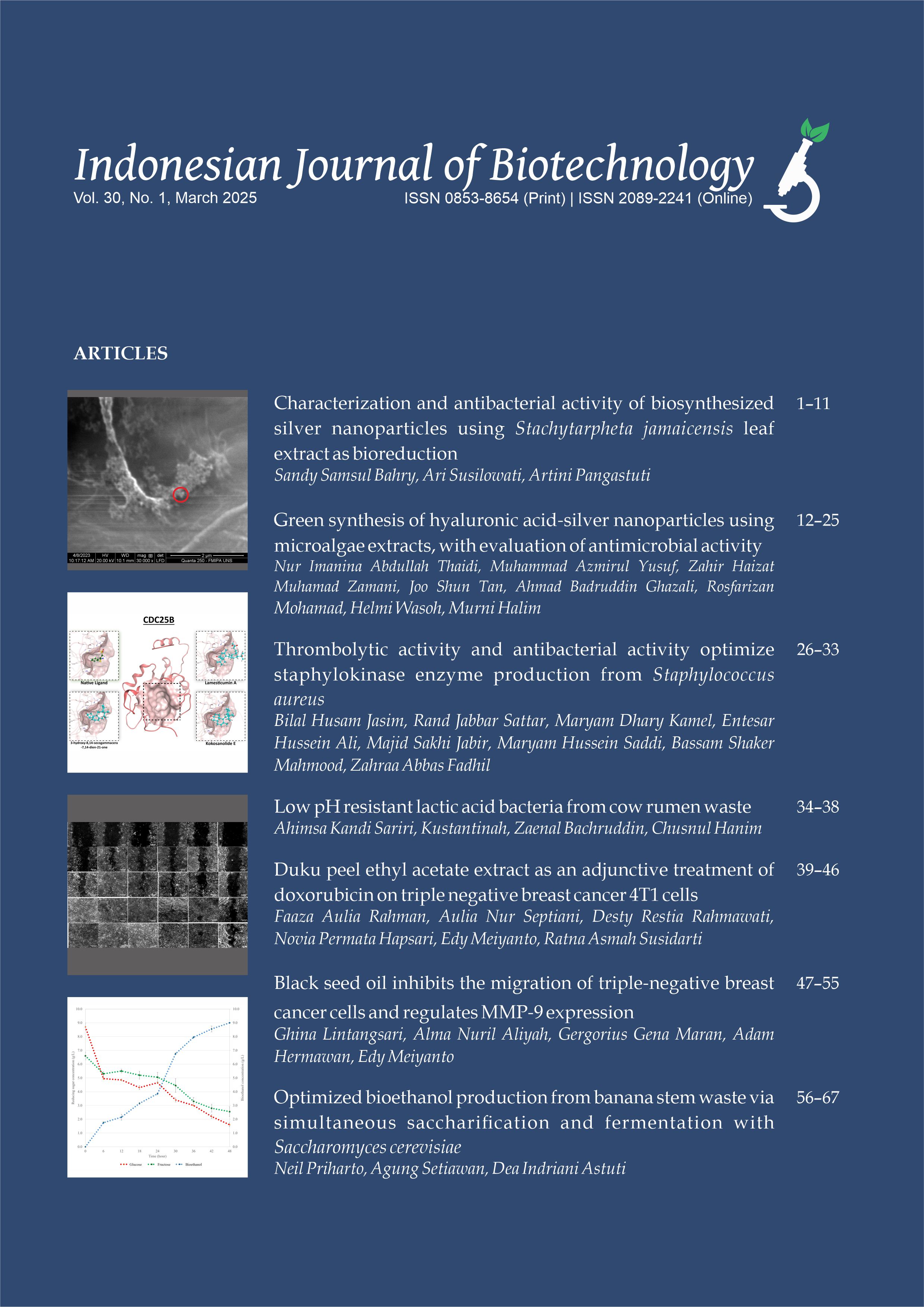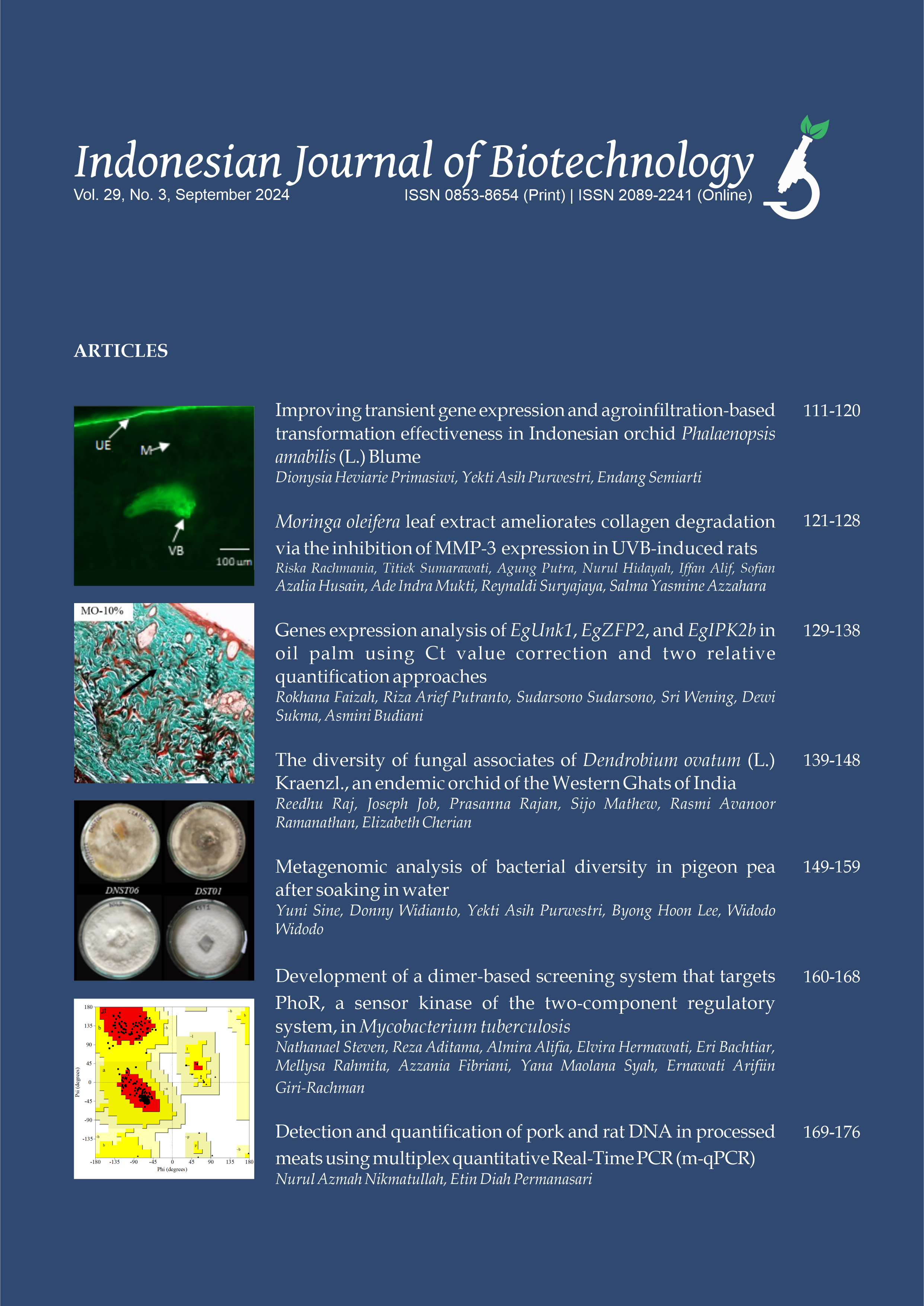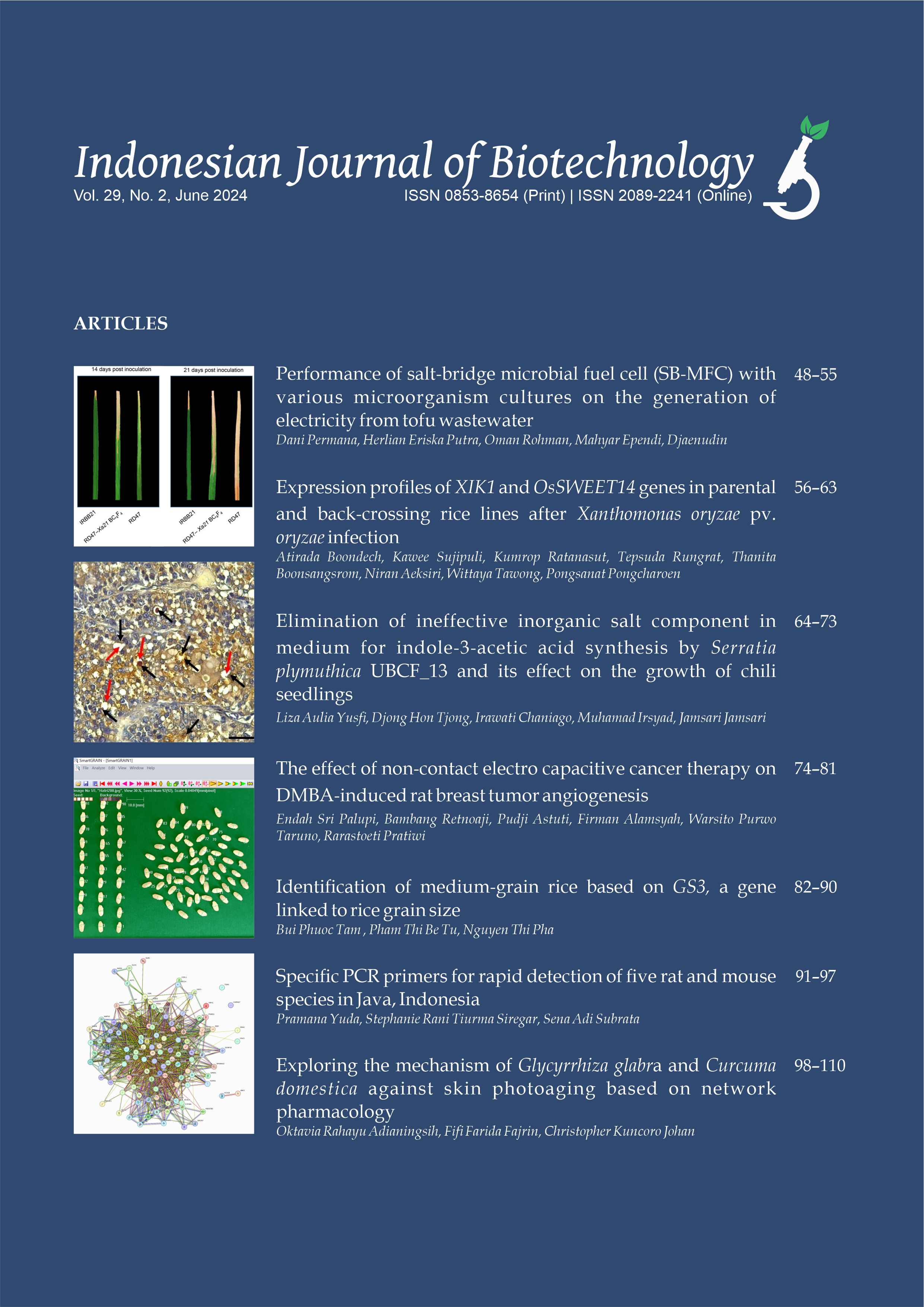The establishment of PCR amplification, cloning, and sequencing of bovine herpesvirus 1 (BHV-1) glycoprotein D gene isolated in Indonesia
Dewi Noor Hidayati(1), Eko Agus Srihanto(2), Tri Untari(3), Michael Haryadi Wibowo(4), Koichi Akiyama(5), Widya Asmara(6*)
(1) Department of Microbiology, Faculty of Veterinary Medicine, Gadjah Mada University, Jalan Fauna No. 2, Karangmalang, Daerah Istimewa Yogyakarta 55281, Indonesia; PUSVETMA (Pusat Veteriner Farma), The Ministry of Agriculture of The Republic of Indonesia, Jalan Frontage Ahmad Yani, Siwalankerto No.68 – 70, Ketintang, Gayungan, Surabaya, Jawa Timur 60231, Indonesia
(2) Veterinary Disease Investigation Lampung (Balai Veteriner Lampung) Jalan Untung Suropati No. 2, Labuhan Ratu, Kedaton, Bandar Lampung 35142, Indonesia
(3) Department of Microbiology, Faculty of Veterinary Medicine, Gadjah Mada University, Jalan Fauna No. 2, Karangmalang, Daerah Istimewa Yogyakarta 55281, Indonesia
(4) Department of Microbiology, Faculty of Veterinary Medicine, Gadjah Mada University, Jalan Fauna No. 2, Karangmalang, Daerah Istimewa Yogyakarta 55281, Indonesia
(5) Advanced Research Support Centre (ADRES), Ehime University, 3-5-7 Tarumi, Matsuyama, Ehime 790-8566, Japan
(6) Department of Microbiology, Faculty of Veterinary Medicine, Gadjah Mada University, Jl. Fauna No. 2, Karangmalang, Daerah Istimewa Yogyakarta 55281, Indonesia
(*) Corresponding Author
Abstract
Considering the increasing incidence of infectious bovine rhinotracheitis (IBR) in Indonesia, it was necessary to conduct a more in-depth study of bovine herpesvirus-1 (BHV-1) as the causative agent of IBR disease. Previous research reports indicate that the BHV-1 subtypes found in Indonesia are subtype 1.1. Currently, IBR field case detection in Indonesia still uses the serological method (ELISA), which has the potential to give false positive results and cannot explain the virus subtype. Other detection methods, such as viral isolation, take longer and require adequate resources. This study aimed to determine the BHV-1 subtypes of Indonesian isolates using molecular techniques. Nested PCR using two pairs of primers was successfully used to amplify the glycoprotein D (gD) gene. The gD gene fragment was cloned into the pGEM-T plasmid. Analysis of the gD gene sequence was subsequently carried out to determine the BHV-1 character of the Indonesian isolates. The results indicated that the isolates were different from the previous isolates, and had similarities (100%) with subtype 1.2 strain SP1777 and SM023.
Keywords
Full Text:
PDFReferences
Ackermann, M. and Engels, M. 2006. Pro and Contra IBR-Eradication. Vet. Microbiol. 113(3-4): 293-302. doi:10.1016/j.vetmic.2005.11.043.
Aswad A, Katzourakis A. 2014. The first endogenous herpesvirus , identified in the tarsier genome , and novel sequences from primate rhadinoviruses and lymphocryptoviruses. Plos Genet. 10(6): 1004332. doi:10.1371.
Babiuk LA, van Drunen Littel-van den Hurk, Tikoo, SK. 1996. Immunology of bovine herpesvirus 1 infection. Vet Microbiol.53: 31-42
Babiuk LA. 2002. Vaccination: a management tool in veterinary medicine. Vet J 164(3):188-201.
Bashir S, Singh R, Sharma B, Yadav SK. 2011. Development of a sandwich ELISA for the detection of bovine herpesvirus type 1. Asian Pac J Trop Med. 4(5):363-366. doi:10.1016/S1995-7645(11)60104-1.
Collins JK, Ayers VK, Whetstone CA. 1993. Antigenic differences between the major glycoproteins of bovine herpesvirus type 1.1 and bovine encephalitis herpesvirus type 1.3. J Gen Virol.74(8):1509-17.
Cowley DB, Graham DA, Guelbenzu M, Doherty ML, More SJ. 2014. Aspects of bovine herpesvirus 1 and bovine viral diarrhoea virus herd-level seroprevalence and vaccination in dairy and beef herds in Northern Ireland. Ir vet j. 67(1):18.
Dummer AL, Pereira Leivas Leite F, Van Drunen Littel-Van Den Hurk S. 2014. Bovine herpesvirus glycoprotein D: A review of its structural characteristics and applications in vaccinology. Vet Res. 45(1):1–12. doi:10.1186/s13567-014-0111-x
Esteves PA, Dellagostin OA, Pinto LS, Silva AD, Spilki FR, Ciacci-Zanella JR, Hübner SO, Puentes R, Maisonnave J, Franco AC, et al. 2008. Phylogenetic comparison of the carboxy-terminal region of glycoprotein C (gC) of bovine herpesviruses (BoHV) 1.1, 1.2 and 5 from South America (SA). Virus Res. 131:16-32. doi:10.1016/j.virusres.2007.08.004.
Gabev E, Tobler K, Abril C, Hilbe M, Senn C, Franchini M, Campadelli-Fiume G, Fraefel C, Ackermann M. 2010. Glycoprotein d of bovine herpesvirus 5 (bohv-5) confers an extended host range to bohv-1 but does not contribute to invasion of the brain. J Virol. doi:10.1128/JVI.00228-10.
Hidayati DN, Untari T, Wibowo MH, Akiyama K, Asmara W. 2018. Cloning and sequencing gB, gD, and gM genes to perform the genetic variability of bovine herpesvirus-1 from Indonesia. Vet World. 11(9):1255–1261. doi:10.14202/vetworld.2018.1255-1261.
Jones C ChowdhuryS. 2007. A review of the biology of bovine herpesvirus type 1 (BHV-1), its role as a cofactor in the bovine respiratory disease complex and development of improved vaccines. Anim. Health Res Rev. 8(2); 187–205
Kaashoek MJ, Van Oirschot JT. 1996. Early immunity induced by a live gE-negative bovine herpesvirus 1 marker vaccine. Vet microbiol. 53(1-2):191-7.
Kelley LA, Mezulis S, Yates CM, WassMN. Sternberg MJ. 2015. The Phyre2 web portal for protein modeling, prediction and analysis. Nature protocols, 10(6):845.
Kit S, Qavi H, Gaines JD, Billingsley P, McConnell S. 1985. Thymidine kinase-negative bovine herpesvirus type 1 mutant is stable and highly attenuated in calves. Arch virol. 86(1-2):63-83.
Kit S, Kit M, McConnell S. 1986. Intramuscular and intravaginal vaccination of pregnant cows with thymidine kinase-negative, temperature-resistant infectious bovine rhinotracheitis virus (bovine herpes virus 1). Vaccine. 4(1):55-61.
Masri SA, Olson W, Nguyen PT, Prins S, Deregt D. 1996. Rapid detection of bovine herpesvirus 1 in the semen of infected bulls by a nested polymerase chain reaction assay. Can JVet Res 60(2):100.
Metzler AE, Matile H, Gassmann U, Engels M, Wyler R. 1985. European isolates of bovine herpesvirus 1: A comparison of restriction endonuclease sites, polypeptides, and reactivity with monoclonal antibodies. Arch Virol. (1-2):57-69. doi:10.1007/BF01317006.
Muylkens B, Tjiry J, Kirten P, Schynts F, Thiry E. 2007. Review article Bovine herpesvirus 1 infection and infectious bovine rhinotracheitis. Vet Res. 38:181–209. doi:10.1051/vetres
Nandi S, Kumar M, Manohar M, Chauhan RS. Bovine herpes virus infections in cattle. 2009. Anim Health Res Rev 10(1):85-98.
Noor HD, Tri U, Haryadi WM, Widya A, Koichi A. 2019. DNA Sequence variability analysis of the gD and the UL36 genes of Bovine herpesvirus-1 isolated from field cases in Indonesia. J Appl Anim Res. 47(1):206-11.
Parreño, V., López, M.V., Rodriguez, D., Vena, M.M., Izuel, M., Filippi, J., Romera, A., Faverin, C., Bellinzoni, R., Fernandez, F. and Marangunich, L. 2010. Development and Statistical Validation of a Guinea Pig Model for Vaccine Potency Testing Against Infectious Bovine Rhinothracheitis (IBR) Virus. Vaccine. 28(13): 2539-2549
Payment P, Assaf R, Trudel M, Marois P. 1979. Enzyme-linked immunosorbent assay for serology of infectious bovine rhinotracheitis virus infections. J Clin Microbiol 10(5):6333-636.
Pidone CL, Galosi CM, Echeverria MG, Nosetto EO, Etcheverrigaray ME. 1999. Restriction endonuclease analysis of BHV‐1 and BHV‐5 strains isolated in argentina. J Vet Med. Series B. 46:453-6.
Raaperi K, Orro T, Viltrop A. 2015. Effect of vaccination against bovine herpesvirus 1 with inactivated gE-negative marker vaccines on the health of dairy cattle herds. Prev vet med. (4):467-76.
Rasheed MA, Ansari AR, Ihsan A, Navid MT, ur-Rehman S, Raza S. 2018. Prediction of conserved sites and domains in glycoproteins B, C and D of herpes viruses. Microb Pathog. doi:10.1016/j.micpath.2018.01.020.
Rola J, Larska M, Polak MP. 2005. Detection of bovine herpesvirus 1 from an outbreak of infectious bovine rhinotracheitis. Bull. Vet. Inst. Pulawy (49):267-271.
Saepulloh M, Adjid R. 2010. Isolasi dan Identifikasi Bovine Herpesvirus-1 pada Sapi Perah dan Potong di Indonesia. JITV. 19:376–387
Saepulloh M, Wibawan I.W.T, Sajuthi, D dan Setiyaningsih, S. 2009. Molecular Characterization of Bovine Herpesvirus Type 1 Indonesian Isolates. JITV 14(1): 66-74.
Sambrook J, Fritsch EF, Maniatis T. 1989. Molecular Cloning: A Laboratory Manual. Cold Spring Harbor Laboratory Press.
Schynts F, Meurens F, Detry B, Vanderplasschen A, Thiry E. 2003a. Rise and survival of bovine herpesvirus 1 recombinants after primary infection and reactivation from latency. J Virol.77:12535-42. https://doi.org/10.1128/JVI.77.23.12535
Schynts F, McVoy MA, Meurens F, Detry B, Epstein AL, Thiry E. 2003b. The structures of bovine herpesvirus 1 virion and concatemeric DNA: Implications for cleavage and packaging of herpesvirus genomes. Virology. doi:10.1016/S0042-6822(03)00437-9.
Smith GA, Young PL, Rodwell BJ, Kelly MA, Storie GJ, Farrah CA, Mattick JS. 1994. Development and trial of a bovine herpesvirus 1‐thymidine kinase deletion virus as a vaccine. Aust vet j. 71(3):65-70.
Spilki, F.R., Esteves, P.A., Lima, M.D., Franco, A.C., Chiminazzo, C., Flores, E.F., Weiblen, R., Driemeier, D. and Roehe, P.M., 2004. Comparative pathogenicity of bovine herpesvirus 1 (BHV-1) subtypes 1 (BHV-1.1) and 2a (BHV-1.2a). Pesqui Vet Bras. 24(1):43-49. doi:10.1590/S0100-736X2004000100010.
Studdert, MJ. 2008. Bovine herpesvirus. Book: Desk Encylopedia of Animal and Bacterial Virology. pp 65 – 71.
Strube W, Auer S, Block W, Heinen E, Kretzdorn D, Rodenbach C, Schmeer N. 1996. A gE deleted infectious bovine rhinotracheitis marker vaccine for use in improved bovine herpesvirus 1 control programs. Vet microbiol. 53(1-2):181-9.
Sudarisman. 2006. Tingkat Efikasi Berbagai Vaksin IBR Inaktif yang Dibuat Menggunakan Virus Isolat Lokal pada Sapi Perah di Kabupaten Bandung yang Diuji dengan Uji Serum Netralisasi. J Vet. 7 (4): 139-147.
Traesel CK, Silva MS, Weiss M, Spilki FR, Weiblen R, Flores EF. 2014. Genetic diversity of 3′ region of glycoprotein D gene of bovine herpesvirus 1 and 5. Virus Genes. 48:438-47. DOI: 10.1007/s11262-014-1040-5; PMID 24482291.
Turin L, Russo S, Poli G. 1999. BHV-1: new molecular approaches to control a common and widespread infection. Mol Med. 5:261–284.
Van Donkersgoed J, Guenther C, Evans BN, Potter AA, Harland RJ. 1995. Effects of various vaccination protocols on passive and active immunity to Pasteurella haemolytica and Haemophilus somnus in beef calves. The Can Vet J 36(7):424.
Van Engelenburg FA, Kaashoek MJ, Rijsewijk FA, Van den Burg L, Moerman A, Gielkens AL, Van Oirschot JT. 1994. A glycoprotein E deletion mutant of bovine herpesvirus 1 is avirulent in calves. J Gen Virol. 75(9):2311-8.
Varela APM, Holz CL, Cibulski SP, Teixeira TF, Antunes DA, Franco AC, Roehe LR, Oliveira MT, Campos FS, Dezen D, et al. 2009. Neutralizing antibodies to bovine herpesvirus types 1 ( BoHV-1 ) and 5 ( BoHV-5 ) and its subtypes. Vet Microbiol. 1:1–7. doi:10.1016/j.vetmic.2009.10.016.
Vlček Č, Beneš V, Lu Z, Kutish GF, Pačes V, Rock D, Letchworth GJ, Schwyzer M. 1995. Nucleotide sequence analysis of a 30-kb region of the bovine herpesvirus 1 genome which exhibits a colinear gene arrangement with the UL21 to UL4 genes of herpes simplex virus. Virology. 210(1):100-8.
Weiblen R, Kreutz LC, Canabarro TF, Schuch LF, Rebelatto MC. 1992. Isolation of bovine herpesvirus 1 from preputial swabs and semen of bulls with balanoposthitis. J Vet Diagn Invest. 4(3):341–343. doi:10.1177/104063879200400321.
WiedmannM., BrandonR, WagnerP, DuboviEJ, BattCA. 1993. Detection of bovine herpesvirus-1 in bovine semen by a nested PCR assay. J. Virol. Methods, 44(1):129-139.
Zhu L, Thompson J, Ma F, Eudy J, Jones C. 2017. Effects of the synthetic corticosteroid dexamethasone on bovine herpesvirus 1 productive infection. Virology. (505):71-79 doi:10.1016/j.virol.2017.02.012.
Article Metrics
Refbacks
- There are currently no refbacks.
Copyright (c) 2019 The Author(s)

This work is licensed under a Creative Commons Attribution-ShareAlike 4.0 International License.









